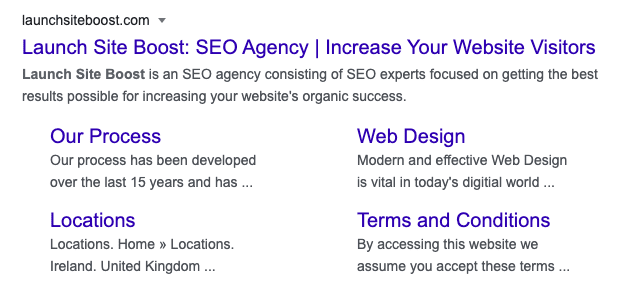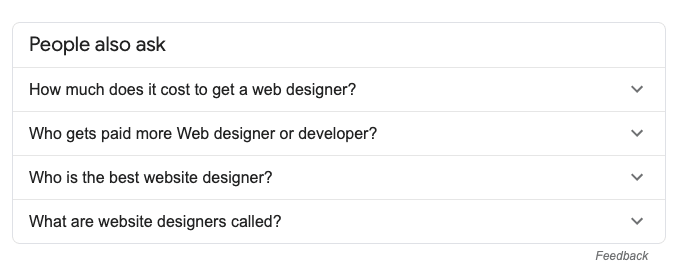Does SEO work for Lead Generation?
This is a common concern for business owners as investing their marketing efforts into SEO can be seen as throwing money into a wishing well and hoping for the best. Usually, they prefer to spend their marketing budget on ads, because they have known what an advert is from an incredibly young age, but are unsure what SEO is, or how it benefits their business.
Let’s instantly switch your mindset to see the positive benefits of SEO.
If you’ve ever needed a product or service and are not sure immediately who to go to, where does your brain tell you to go instantly? You guessed it, straight to Google. Your clients also do this.
In this article, Paul Carey, a Agency Mavericks member from Ireland who runs the SEO agency Launch Site Boost, provides 20 actionable SEO tips for your website that will help you to organically attract more qualified leads for your business, without spending money on ads.
1. Get the Right SEO Foundations in Place
If you are a web designer, then providing your clients with a beautiful looking website is great. But that's just one part of the puzzle.
Clients can sometimes have the assumption on their website that ‘If you build it, they will come’, assuming that they will have thousands of website visitors on launch day, even if you have already set the correct expectations with them.
Building a website for a client that is developed in a way that allows Google to understand it as they crawl it, allows Google to then place it in their index, having it at the ready to show to potential new visitors of the website for relevant searches.
As designers and developers, we usually forget to look after and update our own websites, but it is worth setting aside some time for this, as it is incredibly important to get this part of your SEO strategy correct.
2. Utilise Relevant Keywords
Before doing any SEO work, you need to understand what keywords your potential new leads are actually searching for on a regular basis and how they are relevant to growing your business.
For example, if you are a website agency based in Sydney, you might want to target the following keywords:
- Web design
- Website builder
- Website designer in Sydney
You might look at the phrase “website builder” and think nobody possibly calls it that, but that phrase gets searched about 10,000 times (yes, ten thousand) each and every month in Australia alone. However, now you need to consider what is referred to as ‘searcher intent’. Did the searcher want to find DIY website software? Or a professional who builds websites? You need to try and put yourself in the customer’s shoes for each keyword.
3. Ensure Your Website Works on Mobile Devices
If you are a web designer, one way to get new clients is to reach out to business owners who may not realise that their website isn't mobile-friendly.
“Hi [Business Owner],
I was trying to use your website on my mobile phone but it does not seem to be working.
Did you know that over 50% of website visits are from a mobile device these days?”
You can also explain that as of March 2021, Google will be rolling out their mobile-first index to all sites, meaning if you only have a website that works on a desktop, it will be dropped from Google searches completely. Take that information and get back in touch with everyone in your pipeline who wasn’t ready to have a new site built just yet.
You can just be honest with them. No mobile website = no website visitors.
4. Each of Your Services Needs Its Own Web Page
Most businesses offer more than one type of service to their clients and each service is searched individually on Google. Therefore, it's important to have separate landing pages for each service as it makes it easier for Google to know where to send your leads to.
If you offer ‘Web Design’ as a service, but also offer ‘Website Care Plans’, it would be best to build a page dedicated to displaying the benefits of each service to potential new clients.
Also, just a quick note on the term ‘Website Care Plans’. That term sounds better and is more than likely going to help with your CRO (Conversion-Rate-Optimization), but the term ‘Website Maintenance Packages’ is searched more on Google each month. It is incredibly important that you find the balance between your CRO and SEO in order to maximise results.
5. Know Who Your Ideal Client Is
Whilst it may be possible that you could provide your services to any person or business on the planet, it is important to know who you actually enjoy working with and want to help.
This can also be considered ‘finding your niche’, which is a term that can scare people off due to the associated FOMO (Fear of Missing Out) on potential clients.
However, if you know who you want to serve, this will make every step of your business much easier to manage. Let’s say, as an example, that you serve the wedding industry. (Yes, a niche can be a particular industry, so hopefully, that helps with the FOMO). By having this niche, it allows you to become hyper-focused on a strategic plan for your business in order to effectively serve clients.
Now all of a sudden, you have much more qualified leads as each lead is from within the wedding industry (obviously only if you’ve made it clear on your website that this is who you serve).
6. Create Content That Speaks to Your Ideal Client
Now that you know who you are serving, life has become a lot easier, because you can start jotting down ideas for content that will truly speak to (and relate to) your ideal client.
You will be able to use a language that speaks to them in such a way that when they are consuming your content that they are a little shocked by how extremely relevant and relatable it is to them.
This can start as early as the keyword research phase (using a tool such as SEMRush or Ahrefs), to as late as the ‘Thank You’ page on your website. Each and every single step of their customer journey can now ensure to them that they are indeed in the right place, with a business that understands their needs and is the right choice to help them.
7. Obtain Reputable Backlinks
A backlink is a link to your website from another website. This is an incredibly important part of how Google ranks websites. However, there is a very specific way these should be obtained according to Google’s guidelines. They should be earned naturally over time.
The easiest way to do this is by providing value. As your reputation grows, and you build useful content, people will automatically begin to share it.
Let's use the website agency example again… If a popular influencer (which can be a person or a business) is documenting their own website journey on their blog, and they link to your helpful article ‘7 Things Every Business Needs On Their Website’, then congratulations! You have successfully earned a relative backlink from a reputable source. This will begin to work for you to bring in more qualified leads.
A final note on backlinks – always remember they should be quality over quantity.
8. Use Lead Magnets to Provide Value
Businesses often struggle to think of a lead-magnet they could offer to capture the contact details of potential new clients, but it can literally be as simple as a one page PDF checklist for that user.
Another trap that businesses fall into here is not believing they are providing value and get stuck in the mindset of “Oh but I can’t include that in my checklist as that is so obvious and everyone already knows that”. It isn’t obvious, and they don’t know that, which is why that new lead landed on your website in the first place when seeking help.
If you create websites, a simple lead magnet could be ‘10 Crucial Steps To Consider For Your Website’s Success’ – By the way, feel free to ‘steal’ any of the points from this article to include in your lead magnet, just don’t do a blatant ‘copy and paste’ – make sure you add your own twist.
9. Make Each Step Easy for the User
Your new lead has found you in Google, clicked on your website, and has gained some valuable knowledge and now trusts that you are the person/company to resolve their issues.
Now what?
Make sure to really spell out what their next step is, and make it super simple for them to proceed.
This may sound obvious, but we’ve all been on a website where it’s difficult to actually proceed after you’ve made that important decision to actually part with your cash. You should hold your lead’s hand through every step of their journey to make it easy for them.
10. Testimonials Help to Leads Convert to Clients
This is another point that is really a mixture of CRO and SEO. If a new lead has landed on your website but they have never heard of you, they would like to know that this isn’t your first rodeo and that you’ve been able to help others in their situation in the past.
Testimonials work best when they include a picture (preferably with a nice smile) of your past clients along with who they are, and the nice things that they have said about your offering. Want a great example of this? Take a look at the testimonials page for Agency Mavericks.
11. Harness the Power of Internal Links
An internal link is when you create a piece of content on your website (whether it is a blog, service page, etc) and link it to another page on your website. This helps your potential new lead to see their next logical step of their journey on your website.
Internal links help with your SEO as they essentially send signals to Google that detail your website structure/architecture to them. Make sure to use relevant anchor text (the highlighted linked text) to inform your new leads of what they will find by clicking on that link.
12. Don’t Neglect New Leads Early in Their Journey
You have the ability to create content for new leads no matter where they currently are in their customer journey. Take a look at the search examples below and see if you can spot where that potential new client is in their customer journey:
- How much should I spend on a new website?
- Ideas for websites for accountants
- Web designer in the Sydney area
You can see that each search is bringing that person closer and closer to going from lead to client. Before they even contact you, you can let them know who you are, how you can help them, and begin to build brand awareness and authority with that person.
Most businesses ‘go for the kill’ immediately, which fails. You need to build a relationship with that person in order to build trust. This also helps to qualify them further at each stage.
13. Entice New Leads to Click Your Website Over Others
Having your website appear in the Google search results is a small victory, but it is essentially useless if people don't actually click on your website.
So how do we fix that?
Luckily, every single website has the ability to alter how they appear in the search results.
In order to be more attractive in the SERPs (Search Engine Results Pages), the very first thing to change is your Meta Title and Meta Description, which for some, may seem like incredibly basic SEO, but it is unbelievable how many websites do not utilise this power. Here's an example of the SERP for my website:

If your website is built on WordPress, there is no better option than the Yoast SEO plugin.
14. Place Your Main Keyword in Important Places
In order to give Google a better understanding of what your web page is about (because Google ranks pages individually, not websites as a whole), you should use your main keyword in the places that Google actually can see on your website. A few examples of this would be:
- Heading Tags (H1, H2, etc)
- Page Title (Meta Title, as mentioned above)
- Image File Names and Alt Tag (what the hell is IMG_7869.jpg?)
However, you don’t want to be guilty of ‘keyword stuffing’. This is where you are using your keyword a ridiculous number of times just for the sake of it, which Google sees as a spammy tactic. Our advice is to write your content for humans to consume first, and Google second.
15. Create Relevant FAQs and Include Schema
FAQs are a wonderful way of reducing the number of emails that you receive for how a particular part of your product or service works. It can also help to eliminate the ‘is this the right option for me?’ barrier that new leads may have when they land on your website.
When you write up your FAQs, you can include Schema markup (a small piece of code) which tells Google that that particular piece of content on the page is a set of questions and answers. This can also prompt Google to display your website in the ‘People also ask’ section of their search results, allowing you another opportunity to reach potential new leads:

16. Keep an Eye on Your Competitors
If you Google the keyword that you want to rank for, but your competitors are appearing above you in the search results, it can be easy to work out why. With everything that you have read so far in this article, you should have a fair idea of how to reverse-engineer what your competition is doing in regards to their SEO strategy.
Once you have discovered what they are doing, and how they are implementing those tactics, all you have to do is draw influence from that. We don’t mean copy, as that will not be taken well by your competitor or Google, but your competitor's website should help you to build a framework of how you can create your content in order to attract more qualified leads.
17. Use Industry Keywords on Important Pages
Most website owners see their important pages as their main product or service pages, as this is the section of their website that actually earns revenue for them. You have the opportunity here to really speak the language that is relevant to your website visitor.
Taking the example of a website agency again, your main ‘Web Design’ page could include everything that the visitor would consider ‘music to their ears’ if you were speaking to them face-to-face.
Identify their pain points and address them on the homepage. Explain that their new website will help solve all their problems such as:
- A booking system that syncs with your calendar to reduce admin and avoid overlap
- A secure payment system to ensure clients are pre-paid
- A mobile-optimised site to ensure Google will show your website in search results
These keywords are all relevant, and Google knows that, so they can better understand what your web page is about. It’s how they differentiate between ‘Bass’ (the fish), and ‘Bass’ (the musical instrument). They use other elements of the page to understand the context.
18. Use Local SEO for a Community Boost
Local SEO has become more and more of a hot topic in the last few years. You may think that local SEO only makes sense if you are a restaurant or local shop. But even if you work online and have clients from everywhere, it will still benefit you to focus some efforts into local SEO.
If you have an office that you operate from, this can give you an awesome boost in search results within your local community. And if you operate your business from a home office, there is an option with Google to not list the address publicly.
Register for a free ‘Google My Business’ listing which will allow you to enter data such as your business name, address, phone number, website, and more. All of which is you literally feeding Google with data to verify who you are and what you do. When this is optimised correctly, your business can take up a huge section of the SERPs, and also allows your business the opportunity to appear on Google maps (if you provide the address).
19. Create Easily Consumable Content
Have you ever been on a website where the words that you are reading are one big chunk of text? With no paragraph breaks or headings to help break up the content? We all have, and we all do the same thing when we land on that page, we click the back button and move on to the next website in the search results.
Not only does breaking up your content make it easy for humans to consume (even if they just want to skim it and not read the whole thing) but it actually means that Google has a better experience in terms of understanding what your content is about, so they can push it to more of your potential new leads in the search results when they are in need of that particular piece of content.
20. Use Google Analytics to See Results
Google Analytics is a free service provided by Google that gives you a better understanding of how your website is performing, which can help to determine your next steps in regards to online marketing. You can see how previously qualified leads landed on your website, how long they stayed there for, and much more incredibly valuable information.
Probably the most important feature of Google Analytics is setting up ‘goals’. An example of this would be seeing how many times somebody landed on your website’s ‘Thank You’ page that appears after taking the step that you wanted them to take (eg. register or purchase something).
You can also set up multiple goals to track different stages of your client’s journey, such as filling out a consultation form as one goal, where another goal could be that they actually became a paying client. The more data you have, the better your understanding will be of where you can focus your SEO efforts to attract more qualified leads for your business.
Final Thoughts
There are plenty of tools out there to help you with your SEO research. Check out some of the recommendations in this earlier post from Agency Mavericks.
SEO is not going away anytime soon. Organic results in Google still get the majority of clicks even though ads appear above them. SEO is the long-term success plan for your business. It takes time to kick in (as Google begins to understand what each of your pages are about), but it is 100% worth it.
SEO, when implemented correctly, will continue to pay dividends to your website over time, whereas if your marketing investment was spent only on ads, then you stop seeing returns as soon as those ads are turned off. That’s not to say ads don’t work. They do, and they can be great if you know what you are doing. But SEO should always be a focus for each and every business owner, as it opens up the possibility for qualified lead generation on so many levels.






